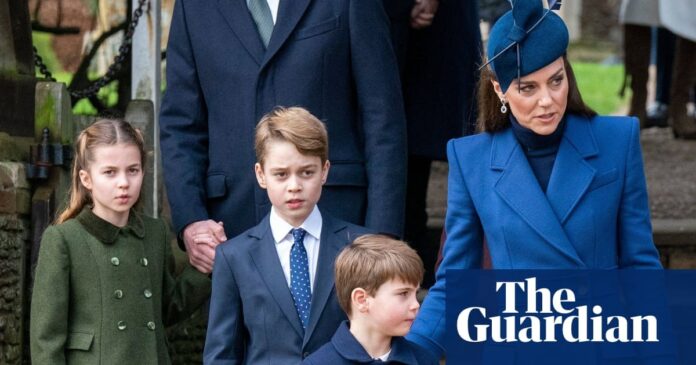For many parents coming to terms with a cancer diagnosis, this is the most difficult conversation to have. How do you tell your children that you have a serious illness and that you are not sure what the future holds?
In her video statement released on Friday, the Princess of Wales said the news of her cancer was a “huge shock”. It had taken her and William “time to explain everything to George, Charlotte and Louis in a way that suits them, and to reassure them that I will be fine”.
It is believed that Kate and William will spend the Easter holidays helping the children understand and accept their mother’s illness. In their case, a family crisis is also a global news story, and great effort will be made to protect the children from ruthless media coverage.
At ages 10, 8 and 5, George, Charlotte and Louis will have different levels of understanding. But the consensus among cancer organizations and oncologists is that there should be as much transparency as possible.
That wasn’t always the case. In the past, cancer was a word spoken in hushed tones and never mentioned in front of children. Some experienced the fear of parental death for years without knowing the cause.
Now, according to Cancer Research, “Being open and honest is almost always the best way with children. Remember that uncertainty or not knowing may be more difficult for them to deal with than the truth.”
The charity advises parents to tailor the message to the age of the child. Younger children have only a basic understanding of illness and may worry that they have done something to cause the cancer or that it could be contagious.
They may not be able to put into words how they feel, but instead express themselves through mood or behavior. Younger children may be more clingy than normal and revert to old behaviors such as thumb sucking, tantrums, or bedwetting.
They may seem withdrawn, or develop new worries and fears, such as being afraid of the dark or of dogs. Some may develop physical symptoms such as headaches or stomach aches, or may have trouble sleeping or having nightmares. Others may show no reaction at all.
Older children have a better understanding of how the body works, the charity says. They can understand that people can have serious diseases. They can also instinctively know if information is being withheld.
says Macmillan Cancer Support: “It’s best to be honest with children. If they think you are being vague or hiding something, they may have a hard time believing they are being told the truth. Don’t make things sound less serious than they are.
“It’s okay to say you don’t know if you can’t answer all their questions. Tell them you will try to find out and that you will tell them when you find out.
The timing of a conversation with children about cancer can be difficult. Some people tell their children as soon as they are diagnosed. Others choose to wait until the test results come back and more is known about the treatment plan.
after newsletter promotion
“There isn’t always a right time. But keeping it a secret can be stressful. It is likely that your children are aware that something is wrong,” says Cancer Research.
When children ask directly whether a parent is going to die, “it is important not to dismiss the question as most children will think so even if they do not say so… It is important that you do not lie to your children.”
Laura decided not to tell her children when she was first diagnosed with cancer. She had just given birth to her third child; her older children were four and eight. “She didn’t tell them anything, they were completely oblivious, and everyone else in the family was silenced,” says Jennifer, her sister.
Five years after diagnosis, Laura was declared cancer-free. But a year later it was back and had spread. “She talked to the older kids, but she said everything would be fine. She played it all off,” Jennifer said. “She didn’t really accept it herself.”
Laura died a year and a half later, in 2011. “It was a shock for the children. Her eldest said she promised them she wouldn’t die. They were completely unprepared.”
Last year, Jennifer was asked to be present by a friend, Claire, when she told her children, ages 10 and 14, that she had just been diagnosed with cancer. “The youngest looked a bit shocked and confused, and the teen was texting her friends while her mother was talking – it was her way of coping.” Neither child asked any questions.
Seven weeks later, Claire died at the age of 51. “She told the children that she would not see them grow up, but that it was not her choice, and that she loved them. It was the conversation my sister should have had,” Jennifer said.



